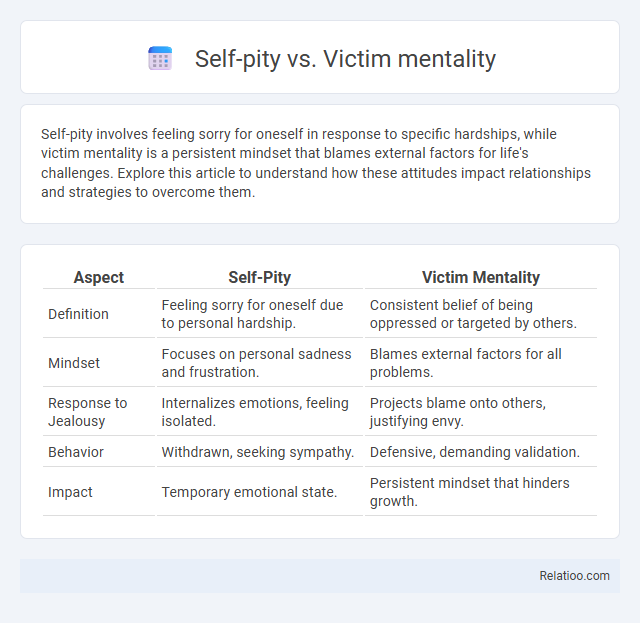Self-pity involves feeling sorry for oneself in response to specific hardships, while victim mentality is a persistent mindset that blames external factors for life's challenges. Explore this article to understand how these attitudes impact relationships and strategies to overcome them.
Table of Comparison
| Aspect | Self-Pity | Victim Mentality |
|---|---|---|
| Definition | Feeling sorry for oneself due to personal hardship. | Consistent belief of being oppressed or targeted by others. |
| Mindset | Focuses on personal sadness and frustration. | Blames external factors for all problems. |
| Response to Jealousy | Internalizes emotions, feeling isolated. | Projects blame onto others, justifying envy. |
| Behavior | Withdrawn, seeking sympathy. | Defensive, demanding validation. |
| Impact | Temporary emotional state. | Persistent mindset that hinders growth. |
Understanding Self-Pity: Definition and Characteristics
Self-pity is an emotional state where you feel sorry for yourself due to personal hardships, characterized by helplessness and a focus on one's own suffering. Unlike victim mentality, which involves a persistent belief that external forces are to blame for your misfortunes, self-pity tends to be more transient and introspective. Recognizing the defining traits of self-pity empowers your ability to address it constructively and avoid falling into prolonged patterns of victimhood.
Victim Mentality Explained: Core Traits and Behaviors
Victim mentality is characterized by a persistent belief that external forces are responsible for one's misfortunes, leading to a pattern of blaming others and avoiding personal responsibility. Core traits include chronic self-victimization, feelings of powerlessness, and an inability to see solutions beyond perceived injustices. Unlike occasional self-pity or recognizing challenges, victim mentality involves deeply ingrained behaviors that hinder growth and resilience.
Key Differences Between Self-Pity and Victim Mentality
Self-pity involves feeling sorry for oneself due to perceived hardships, often leading to temporary emotional distress, while victim mentality is a persistent mindset where individuals consistently see themselves as victims, blaming external factors for their problems. Key differences include self-pity being an occasional emotional response, whereas victim mentality shapes a person's outlook and behavior over time. Victim mentality often results in avoidance of responsibility and empowerment, unlike self-pity, which generally indicates momentary vulnerability without entrenched negative beliefs.
Psychological Roots of Self-Pity
Self-pity stems from deep psychological roots tied to feelings of helplessness and low self-worth, whereas victim mentality extends this mindset by consistently blaming external circumstances for personal misfortunes. Your understanding of these differences can help in recognizing self-pity as a temporary emotional state, while victim mentality reflects a pervasive worldview that hinders personal growth. Addressing the psychological causes, such as unmet emotional needs or trauma, is crucial for overcoming self-pity and fostering resilience.
What Fuels a Victim Mentality?
A victim mentality is fueled by persistent negative self-perception, externalizing blame for personal failures, and a lack of accountability, often reinforced by a cycle of self-pity and learned helplessness. Individuals entrenched in victim mentality may consistently interpret life experiences through a lens of powerlessness, which diminishes resilience and impedes proactive problem-solving. This mindset is further sustained by cognitive distortions like overgeneralization and personalization, creating a self-reinforcing loop that inhibits growth and empowerment.
Emotional Impact: Short- and Long-Term Effects
Self-pity often leads to temporary feelings of sadness and withdrawal, while victim mentality creates a persistent sense of helplessness and blame that can hinder emotional growth. In the short term, self-pity may provide a moment of emotional release, but long-term reliance on victim mentality fosters chronic stress, anxiety, and depression. Recognizing and addressing these emotional impacts is crucial for developing resilience and improving mental health outcomes.
Self-Pity and Victim Mentality in Relationships
Self-pity in relationships often manifests as an inward focus on personal suffering, leading individuals to seek empathy without addressing underlying issues, whereas victim mentality externalizes blame, causing persistent feelings of helplessness and resentment toward partners. Both mindsets hinder effective communication and conflict resolution, perpetuating emotional distance and dissatisfaction. Overcoming these patterns requires cultivating accountability and empathy to foster healthier, more resilient connections.
Overcoming Self-Pity: Practical Strategies
Overcoming self-pity requires recognizing the difference between self-pity as a temporary emotional response and victim mentality as a persistent mindset that hinders growth. You can break free from self-pity by practicing self-compassion, setting achievable goals, and reframing negative thoughts into empowering perspectives. Developing resilience through mindful habits and seeking supportive relationships enhances your ability to move beyond victimhood and regain control over your life.
Breaking Free from Victim Mentality: Steps to Empowerment
Breaking free from victim mentality requires recognizing the shift from self-pity, which involves temporary feelings of sorrow, to a persistent victim mindset that undermines personal empowerment. Key steps include fostering self-awareness, challenging negative beliefs, and embracing accountability to shift from passive suffering to active growth. Empowerment emerges by cultivating resilience, setting boundaries, and pursuing goals that reinforce autonomy and self-efficacy.
Building Resilience: Embracing Accountability and Growth
Understanding the differences between self-pity, victim mentality, and genuine self-reflection is crucial for building resilience. While self-pity involves feeling sorry for yourself and victim mentality deflects responsibility, true growth comes from embracing accountability and learning from challenges. Your ability to shift focus from blame to proactive solutions strengthens emotional resilience and fosters personal development.

Infographic: Self-pity vs Victim mentality
 relatioo.com
relatioo.com